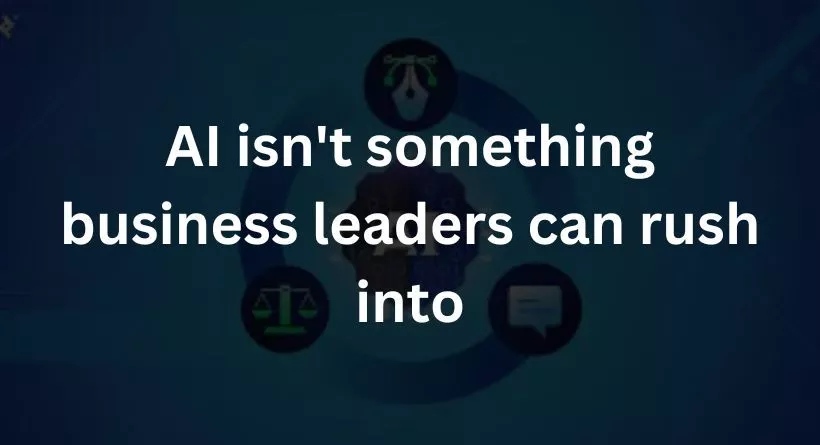
Artificial Intelligence (AI) has taken the business world by storm in recent years, promising increased efficiency, productivity, and profitability. However, the implementation of AI isn’t something that business leaders can rush into. This article explores the intricacies of adopting AI in business and why a prudent approach is crucial for success.
Introduction to AI in Business

Artificial Intelligence, often referred to as AI, is a broad field that encompasses the development of machines and software capable of performing tasks that typically require human intelligence. In the business world, AI has gained immense popularity due to its potential to revolutionize operations, enhance decision-making, and improve customer engagement.
The Importance of Strategic Planning
One of the critical aspects of incorporating AI into business operations is strategic planning. Business leaders must have a clear vision of how AI aligns with their long-term goals. Rushing into AI without a well-defined strategy can lead to haphazard implementation and wasted resources.
Understanding the Potential
AI offers immense potential, from automating routine tasks to providing valuable insights through data analysis. Business leaders need to understand the various applications of AI to harness its power effectively.
You may also like reading: How Businesses Are Using Artificial Intelligence In 2023
Identifying Suitable Use Cases
Not all businesses benefit equally from AI. It’s essential to identify suitable use cases within your industry or organization where AI can make a meaningful impact. Rushing into AI without this understanding can lead to misallocation of resources.
Data and Infrastructure Requirements
AI relies heavily on data. Business leaders must ensure that they have the necessary data infrastructure to support AI initiatives. Rushing into AI without the right data infrastructure can lead to inefficiencies and delays.
Investment and Budget Considerations
AI implementation can be costly. Rushing into AI without a realistic budget can lead to financial strain and an inability to see the project through.
Talent Acquisition and Training
Skilled AI professionals are in high demand. Rushing into AI without a plan for talent acquisition and training can lead to a shortage of qualified personnel.
Ethical and Regulatory Compliance
AI raises ethical and regulatory concerns. Rushing into AI without a thorough understanding of these issues can result in legal complications and reputational damage.
The Role of AI in Automation
AI can automate many processes, but its successful integration requires careful planning to ensure a seamless transition and the preservation of essential jobs.
AI for Customer Engagement

AI can enhance customer engagement through chatbots and personalized recommendations. Rushing into AI without considering customer experience can have adverse effects.
AI-Driven Insights for Decision-Making
AI can provide valuable insights to aid decision-making. Business leaders should integrate AI strategically to maximize its benefits.
Measuring AI ROI
It’s essential to measure the return on investment (ROI) of AI projects. Rushing into AI without a framework for evaluating ROI can lead to uncertainty about the project’s success.
The Pitfalls of Hasty Implementation
Rushing into AI can lead to various pitfalls, including wasted resources, technological glitches, and dissatisfaction among employees.
Building a Strong Foundation
A prudent approach to AI adoption involves building a strong foundation through careful planning, investment, and talent acquisition.
Conclusion
In conclusion, AI isn’t something business leaders can rush into. The benefits of AI are attainable, but they require a strategic and prudent approach. By understanding the potential, identifying suitable use cases, and addressing infrastructure, budget, and ethical concerns, business leaders can harness the power of AI successfully.
FAQs
What is the first step in implementing AI in business?
The first step is to have a well-defined strategy that aligns with long-term goals.
How can businesses identify suitable use cases for AI?
Businesses should identify areas where AI can make a meaningful impact within their industry or organization.
What are the budget considerations for AI implementation?
AI implementation can be costly, so businesses need to have a realistic budget in place.
Why is ethical and regulatory compliance important in AI adoption?
AI can raise ethical and legal concerns, and addressing them is crucial to avoid complications.
What are the common pitfalls of rushing into AI implementation?
Rushing into AI can lead to wasted resources, technical issues, and employee dissatisfaction.





